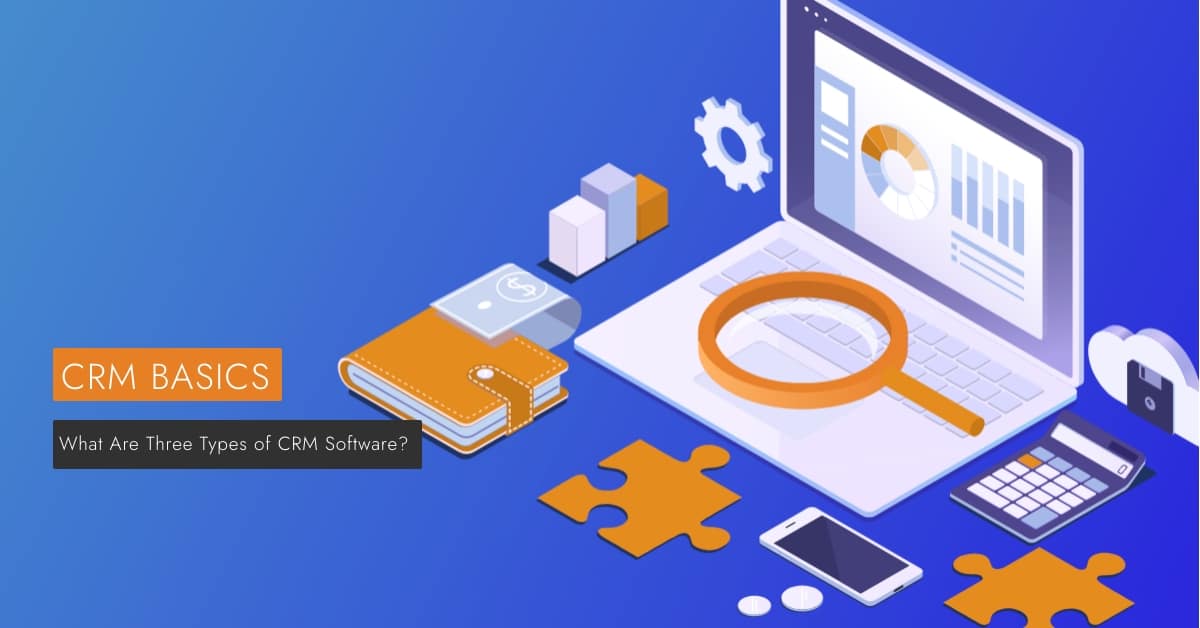What Are Three Types of CRM Software?

If you’re searching for a CRM software that meets your company’s needs, you probably know by now just how many products are on the market. Knowing which type of CRM software is right for your company can be a difficult task.
Before you decide which CRM product to buy, let’s talk about the different types of CRM software: collaborative, analytical, and operational.
- Collaborative CRM software facilitates communication and collaboration between departments, divisions, and even between organizations.
- Analytical CRM software focuses on collecting and analyzing large amounts of data to help organizations make better sales and marketing decisions.
- An operational CRM is client-centric software that focuses on building and maintaining customer relationships.
In this post, we’ll explore each type of CRM further to help you understand which type of software is best suited for your business needs.
Collaborative CRM
Collaborative CRMs focus on sharing customer information and behaviour to various teams in your organization for the purpose of lowering marketing costs, increasing sales, and improving customer satisfaction.
It is also known as a “Strategic CRM”, as it sheds more light on business–customer engagement and communication.
What Are the Features and Benefits of a Collaborative CRM?
Interactions
Your CRM starts collecting customer data the moment their contact information is added to the system. It records all touch-points, emails, conversations, and purchases. Sales and marketing teams can find all this information straight from the CRM, thus improving intra-office communication. The data can also be tracked and analyzed to find trends and marketing opportunities.
Data Management
All documents shared within the process are available for reference among the team members. From proposals to contracts to other technical documents, the collaborative CRM system stores them all within the customer’s profile.
Relationship Management
As part of the lead management process, the CRM segments the leads into various groups based on their search behaviour, demographics, or lead score. This information helps sales reps focus on the leads that are most likely to buy.
The collaborative CRM benefits the business in the following ways:
- It ensures your team members are all on the same page.
- Customer feedback gives the company the upper hand when managing clients’ expectations.
- All your client data is collected and stored under one roof, and as soon as new leads are made, they are automatically assigned a sales rep.
Analytical CRM
Besides the standard data collection, an Analytical CRM organizes and analyzes data about your customers. Such information is instrumental in business decisions, especially in sales and customer service.
What Are the Features and Benefits of Analytical CRM?
Data Mining
When setting up customer accounts, your contact data, such as a person’s age, level of education, gender, location, etc., give you vast amounts of information from which to analyze sales trends, address customer pain points, and target new customers.
Custom Charting
View your data with customizable charts that make sense to your organization and retrieve the information you need with advanced search options.
Sales Forecasting
Analytical CRM software learns the probability of closing over time as more and more data is added to the CRM. Accurate forecasting helps decision-makers manage their sales teams more effectively.
Analytical CRM helps companies make smarter business decisions based on customer behaviour and engagement. In essence, it simplifies your sales strategy and makes deliberate efforts to focus on processes that offer a shorter ROI.
Operational CRM
An operational CRM maps out the sales and marketing processes with specific timelines and expectations. The outcome is a pre-meditated procedure that the CRM can control, making business development easy to manage.
What Are the Features and Benefits of Operational CRM?
Sales Stages
Administrators choose what should be done at each sales stage. Once the sales team has completed every task in a specific stage, they are automatically moved to the next stage.
Marketing Automation
Marketing automation makes it easy for organizations to create hyper-targeted campaigns to different lead segments based on their demographics. Decision-makers can take the collected data and turn it into actionable and automated tasks that teams no longer have to manually oversee.
In short, operational CRMs reduce the time spent on repetitive data-entry tasks and can streamline the sales process with lead assignment rules and user-defined sales stages.
Which CRM Is Best For My Business?
Are you looking for a CRM but aren’t sure which type is the most suitable for your business? We highly recommend browsing the most popular CRM software products on the market and exploring the various features available. Many CRMs available today are equipped with operational, analytical, and collaborative tools, much like Veloxity. Check out our features or get started with our free trial today!
